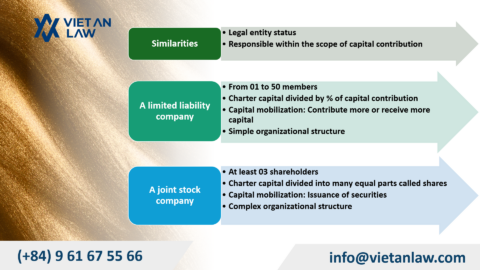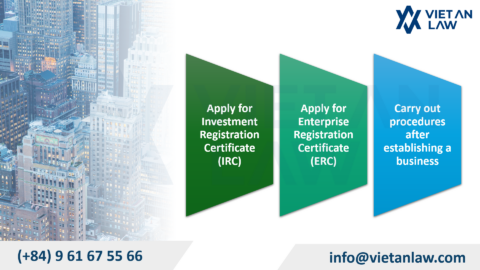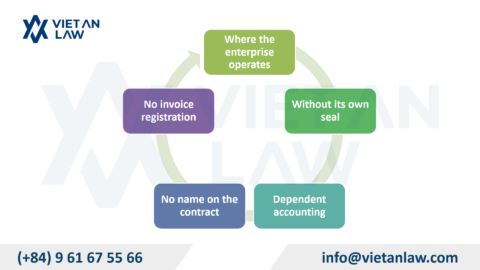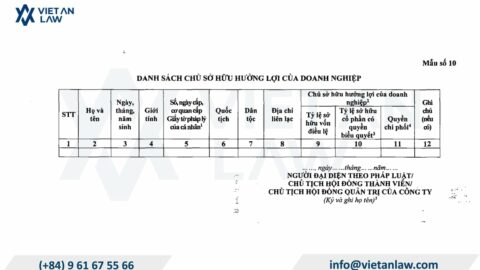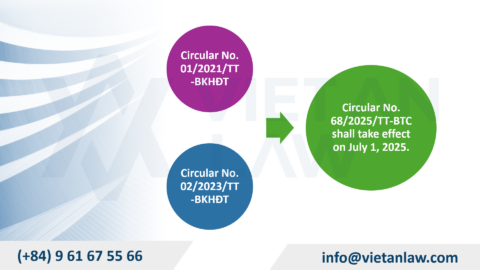Accounting for company establishment costs is an important process for newly born businesses. In the context of a strongly growing economy, establishing a business is not only a major event for founders but also contributes positively to the diversity and enrichment of the business community. In the article below, Viet An Law will provide some information about the accounting service for company establishment costs in Vietnam, important aspects to pay attention to, and the benefits that cost accounting brings to sustainable development.

In addition to the costs of renting a location and carrying out initial procedures to have a business registration location, businesses need to prepare taxes and fees according to state regulations to carry out business establishment procedures. These costs include:
Business registration fees are paid at the Department of Planning and Investment
According to the provisions of the Enterprise Law 2020, within 30 days, businesses must publish the business registration content on the National Business Information Portal.
The fee for publication of business registration content according to Circular 47/2019/TT-BTC is 100,000 VND.
The tax code is issued at the same time as the business code recorded in the business registration certificate. This means that invoice issuance and tax deduction declaration also arise from the time of completing business registration procedures. Can previous fees and charges for business registration be deducted from business expenses?
According to the provisions of Article 6 of Circular 78/2014/TT-BTC, as amended and supplemented by Circular 96/2015/TT-BTC, except for expenses that cannot be deducted when determining taxable income, the expenses that meet all prescribed conditions are deductible. Conditions include:
For business establishment costs that meet all of the above conditions, they must not fall into one of the non-deductible cases, specifically, depreciation costs of fixed assets can be deducted from enterprise expenses.
Regulations on this issue, in Clause 3, Article 3 of Circular No. 45/2013/TT-BTC, enterprise expenses are not intangible fixed assets but are gradually allocated to the enterprise’s business expenses over time. The maximum period must not exceed 3 years from the date the business begins operations. This cost allocation regulation also applies to several costs incurred before establishing a business such as employee training costs, advertising costs incurred before establishing a business, costs for the research phase, relocation costs, purchasing costs to obtain and use technical documents, patents, technology transfer licenses, and trademarks.
In Clause 12, Article 14, Circular 219/2013/TT-BTC regulates costs related to establishing businesses, and purchasing goods and supplies made by organizations and individuals. Authorizing founders with valid authorization documents are regulated as follows:
“12. Business establishments are allowed to declare and deduct VAT on goods and services purchased under the authorization of another organization or individual and the invoice bears the name of the authorized organization or individual, including the following cases:
Accordingly, if the founders have written authorization for individuals to pay for some expenses related to the establishment of a company or enterprise, the purchase of goods and supplies, the enterprise may declare input value added tax deduction.
Thus, businesses can declare and deduct input value-added tax according to value-added invoices in the name of authorized organizations and individuals. For invoices with a value of 20 million VND or more, businesses must make payments to authorized organizations and individuals via banks and have legal documents (invoices, legal documents). If there are no legal documents, the enterprise cannot declare those costs as input VAT deductible costs and cannot account for other deductible costs when calculating income subject to corporate income tax.
Currently, depending on each unit, there are different prices. The cost depends on the unit providing the seal engraving service and the type of seal required by the business. The price for a company round stamp ranges from 200,000 VND to 300,000 VND. Seal the title of Director, Chairman…. from 70,000 VND to 150,000 VND.
Depending on the sign-making unit, there are different prices. On the market, prices fluctuate from 300,000 VND to 1,500,000 VND depending on the material and size of the sign.
The digital signature is an encrypted USB format used instead of the signature and seal of the legal representative to sign declarations or other online operations to identify all operations as belonging to the business. Businesses contact digital signature providers such as Viettel, Vina, and Vinca to purchase a Digital Signature device.
Cost depends on the provider and the number of years of service. Digital signatures with 03 years of use range from 1,500,000 VND to 2,000,000 VND.
Businesses must open a bank account for transactions and to pay taxes according to current mandatory regulations. The account opening procedure is free of charge. However, businesses need to ensure the account balance is at least 1,000,000 VND.
According to the provisions of Decree 139/2016/ND-CP regulating license fees, amended and supplemented by Decree 22/2020/ND-CP, Decree 126/2020/ND-CP, License fees are based on the company’s charter capital and divided into the following two levels:
For clients who need advice on accounting for company establishment costs, please contact Viet An Law Firm for the best support.
